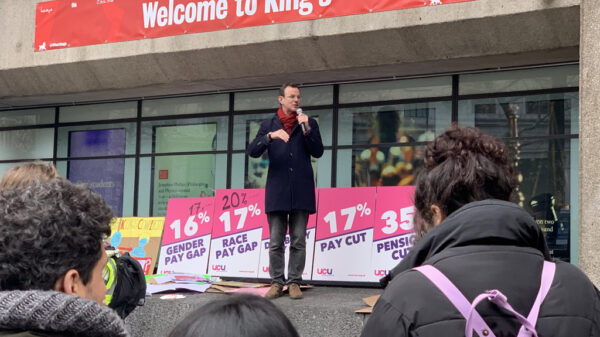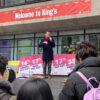The hoarding on the statue of Thomas Guy at King’s College London (KCL) Guy’s Campus has been removed for the first time since 2020 to allow for conservation work to take place. A temporary plaque, stating some of Guy’s wealth “came from investments in the South Sea Company, which was directly involved in the trade of enslaved people,” has been erected.
The original decision to cover the statues was announced in June 2020 in a joint statement by KCL, Guy’s & St Thomas’ NHS Foundation Trust and Guy’s and St Thomas’ Charity. It came in the wake of Black Lives Matter protests across the UK and the toppling of a statue of slave trader Edward Colston in Bristol.
Guy’s & St Thomas’ Foundation, who own the statue, announced in September last year that they intended to relocate the statue “to a less prominent location in the local area around Guy’s Hospital.” They also announced their intention to add a plaque to the statue explaining Guy’s connections to the slave trade.
Their announcement came more than a year after the statue was boarded up, and followed a public consultation and historical research into Guy and Sir Robert Clayton, the first president of St Thomas’ Hospital. A similar plaque was announced for the statue of Clayton at St Thomas’, which also had hoarding removed for conservation work.
The research revealed that Guy invested £45,500 in the South Sea Company, equivalent of £102 million in 2021 according to the calculator used by the researchers. It also stated that during his time as an investor, the Company transported 15,901 enslaved Africans across the Atlantic.
In light of the announcement, the foundation was criticised for its actions by Oliver Dowden MP, the then culture secretary, who accused them of “pandering to wokery.” Quoted in The Times, he said:
“This looks like badly misplaced priorities from these institutions. Instead of pandering to wokery, they should be focused on their important day jobs. Confident nations retain and explain, they don’t hide their history away.”
Days prior to this, legal advice taken by the foundation had stated that any application to move the statue would be “unlikely to succeed.” It cited the “current policy climate in which the whole topic of contested heritage is new and politically charged” as a key factor in the conclusion. As a result, the foundation announced it would not be submitting an application to relocate.
In their statement regarding the current de-hoarding, the foundation added that they intended to submit planning applications to install permanent plaques in December. They aim to have them installed in 2023.
Quoted in The Times, KCL dean, The Revd Dr Ellen Clark-King, said:
“Like many organisations, at King’s, we know that we have a duty to address the legacy of colonialism, racism and slavery in our own work. King’s has begun its own history research project that will confront truths about our own connections and their challenging legacy, including the university and associated institutions and partners.”















